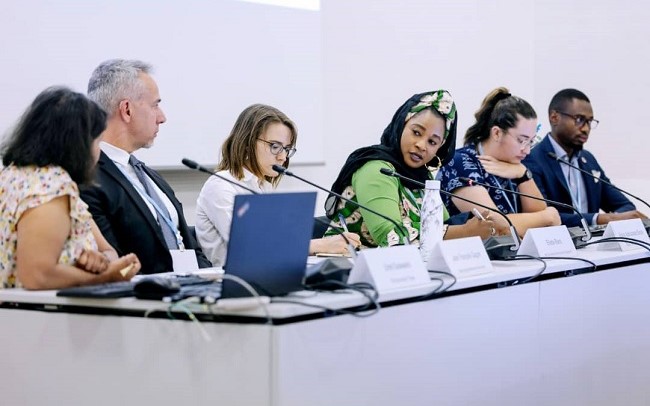At the ongoing 62nd Session of the UNFCCC Subsidiary Bodies (SB62) in Bonn, Germany, Aishat A. Barde, Commissioner of Environment and Climate Change of Taraba State in Nigeria, made a strong case for the inclusion and empowerment of subnational actors in the evolving Global Climate Action Agenda as the world prepares for COP30 in Belém, Brazil.

Speaking on Friday, June 20, 2025, during a high-level session led by the incoming COP30 Presidency and the UN Climate High-Level Champions, Barde answered critical intervention questions: What have your initiatives been able to deliver so far? And how can the framework that we just presented support you in delivering more and faster?
In her remarks, Barde highlighted Taraba State’s dual reality: a region blessed with rich biodiversity, cultural heritage, natural resources and diverse ecological zones such as the iconic Gashaka Gumti National Park, yet increasingly vulnerable to the escalating impacts of climate change, including flooding, drought, soil erosion, and desertification.
Barde emphasised that while global ambition is vital, implementation is local. She outlined a number of bold climate initiatives Taraba State has already undertaken that align with the themes of the emerging Global Climate Action Agenda:
Institutional Reform: The transformation of the Ministry of Environment into the Ministry of Environment and Climate Change to mainstream climate governance and enhance inter-agency coordination.
- Community Engagement: Targeted awareness campaigns on climate change across local communities, with special emphasis on mobilizing women through clean cooking initiatives.
- Budgetary Commitment: In 2024, the State dedicated 5% of its budget to the Re-Greening Taraba Initiative, advancing afforestation and sustainable environmental practices.
- Massive Tree-Planting Campaign: A successful 2 million tree planting drive, featuring a mix of economic and native species to combat land degradation and enhance carbon sequestration.
- The State’s government Strategic Planning: through the drafted first-ever Climate Change Policy and Action Plan, laying out a pathway to a climate-resilient Taraba by 2060. The plan ambitious targets as: 90% renewable energy penetration by 2060; 30% reduction in transport sector emissions by 2030; Large-scale restoration of degraded lands through afforestation; and Promotion of climate smart Agricultural and livestock practices.
Call for Global Support
Commissioner Barde used the platform to call for deeper partnerships and support from international institutions and climate finance mechanisms: “Subnational governments are closest to the risks – and to the solutions.”
She acknowledged the growing support from partners like the Federal Ministry of Environment, National Council on Change Secretariat, Under2 Coalition, and Afrange African Climate Foundation, but stressed the urgent need for capacity building, technology transfer, and direct access to climate finance, particularly grants-based climate funds for adaptation and mitigation projects.
Conclusion
The intervention underscored how subnational entities like Taraba State are not only willing but capable of delivering transformative climate solutions – if empowered. As the world looks toward COP30, voices like Taraba’s are essential in shaping a truly inclusive, action-oriented global climate agenda.
